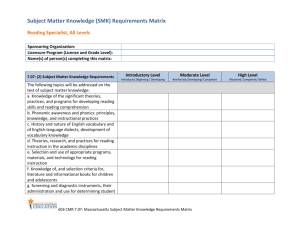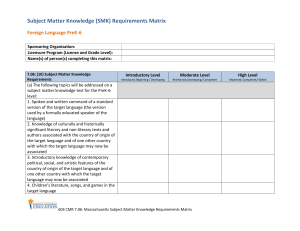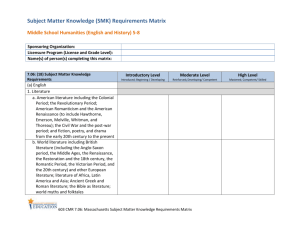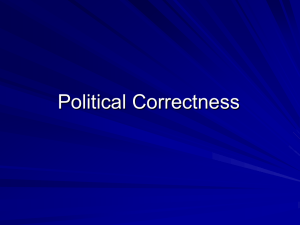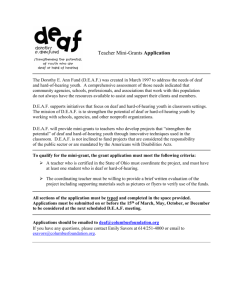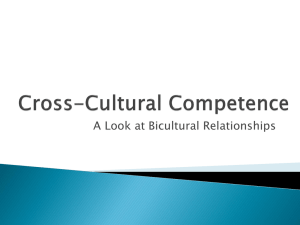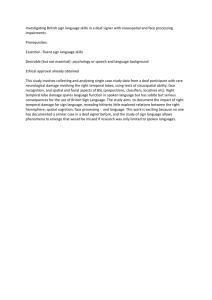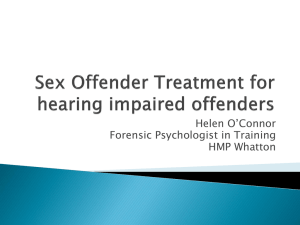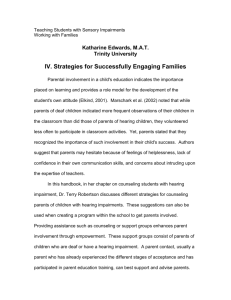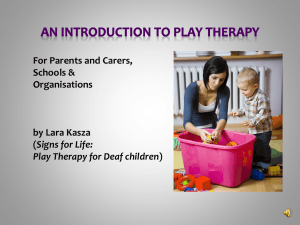SMK Deaf and hard of hearing oral aural and American Sign
advertisement
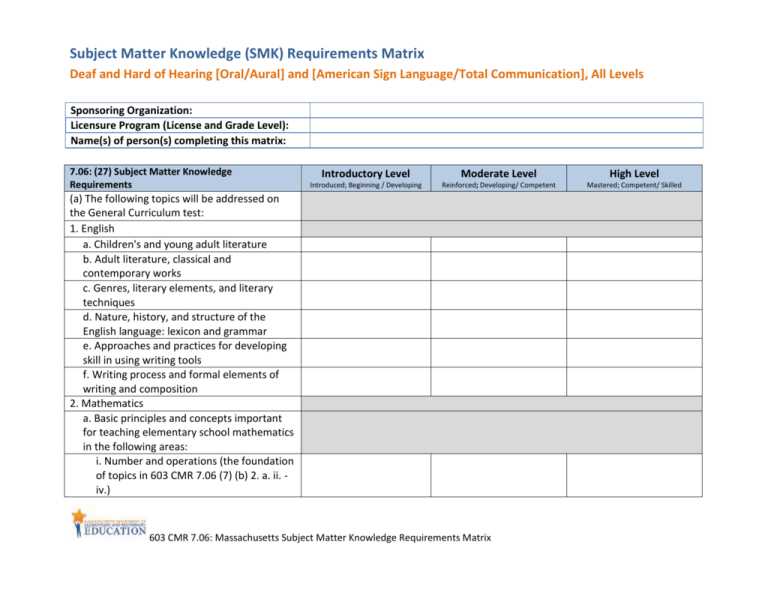
Subject Matter Knowledge (SMK) Requirements Matrix Deaf and Hard of Hearing [Oral/Aural] and [American Sign Language/Total Communication], All Levels Sponsoring Organization: Licensure Program (License and Grade Level): Name(s) of person(s) completing this matrix: 7.06: (27) Subject Matter Knowledge Requirements Introductory Level Moderate Level High Level Introduced; Beginning / Developing Reinforced; Developing/ Competent Mastered; Competent/ Skilled (a) The following topics will be addressed on the General Curriculum test: 1. English a. Children's and young adult literature b. Adult literature, classical and contemporary works c. Genres, literary elements, and literary techniques d. Nature, history, and structure of the English language: lexicon and grammar e. Approaches and practices for developing skill in using writing tools f. Writing process and formal elements of writing and composition 2. Mathematics a. Basic principles and concepts important for teaching elementary school mathematics in the following areas: i. Number and operations (the foundation of topics in 603 CMR 7.06 (7) (b) 2. a. ii. iv.) 603 CMR 7.06: Massachusetts Subject Matter Knowledge Requirements Matrix 7.06: (27) Subject Matter Knowledge Requirements Introductory Level Moderate Level High Level Introduced; Beginning / Developing Reinforced; Developing/ Competent Mastered; Competent/ Skilled ii. Functions and algebra iii. Geometry and measurement iv. Statistics and probability b. Candidates shall demonstrate that they possess both fundamental computation skills and comprehensive, in-depth understanding of K-8 mathematics. They must demonstrate not only that they know how to do elementary mathematics, but that they understand and can explain to students, in multiple ways, why it makes sense. c. The Commissioner, in consultation with the Chancellor of Higher Education, shall issue guidelines for the scope and depth of knowledge expected in mathematics, described in 603 CMR 7.06 (7) (b) 2 a. and b. 3. History and Social Science a. Major developments and figures in Massachusetts and U.S. history from colonial times to the present b. Major developments and figures in world history, with stress on Western civilization c. Basic economic principles and concepts d. Basic geographical principles and concepts e. U.S. political principles, ideals, founding documents, institutions, and processes, their history and development 4. Science and Technology/Engineering 603 CMR 7.06: Massachusetts Subject Matter Knowledge Requirements Matrix 7.06: (27) Subject Matter Knowledge Requirements Introductory Level Moderate Level High Level Introduced; Beginning / Developing Reinforced; Developing/ Competent Mastered; Competent/ Skilled a. Basic principles and concepts of the life sciences appropriate to the elementary school curriculum b. Basic principles and concepts of the physical sciences appropriate to the elementary school curriculum c. Principles and procedures of scientific inquiry d. History of major scientific and technological discoveries or inventions e. Safety issues related to science investigations (b) The following topics shall be included in an approved program but will not be addressed on a test of subject matter knowledge: 1. Theories of language acquisition for American Sign Language (ASL) and English in hearing and deaf and hard-of-hearing children 2. Theories on the relationship between ASL and the English language 3. Similarities and differences in the linguistic structure of ASL and English 4. Benefits and limitations of ASL, spoken English, and printed English for learning, and the instructional strategies for using them 5. Knowledge of how deaf people live their daily lives 6. Historical and current developments in deaf education in the United States and other countries 603 CMR 7.06: Massachusetts Subject Matter Knowledge Requirements Matrix 7.06: (27) Subject Matter Knowledge Requirements Introductory Level Moderate Level High Level Introduced; Beginning / Developing Reinforced; Developing/ Competent Mastered; Competent/ Skilled 7. Features of family support and services 8. Similarities and differences between hearing and deaf and hard-of-hearing students in emotional, social, and intellectual development 9. Ways to prepare deaf and hard-of-hearing students for classrooms ranging from general education classrooms to schools for the deaf and hard-of-hearing 10. Design or modification of the curriculum and instructional materials for the deaf and hard-of-hearing 11. Modifications of theories of reading for hearing children necessary for the learning of reading by deaf and hard-of-hearing children 12. General and specific effects of hearing loss upon the production of speech and the reception of speech and other sounds 13. General and specific effects of visual processing and reception of a visual language and its acquisition 14. Anatomy and physiology of human speech, hearing, and language mechanisms 15. Knowledge of state-of-the-art diagnostic instruments; procedures for testing and interpreting results 16. Characteristics of types of amplification equipment and their uses by teachers and students 17. Medical, social, ethical, and educational research relating to the deaf and hard-ofhearing, including the effects of cochlear 603 CMR 7.06: Massachusetts Subject Matter Knowledge Requirements Matrix 7.06: (27) Subject Matter Knowledge Requirements Introductory Level Moderate Level High Level Introduced; Beginning / Developing Reinforced; Developing/ Competent Mastered; Competent/ Skilled implants on language learning 18. Preparation, implementation, and evaluation of Individualized Education Programs (IEPs) 19. Federal and state laws pertaining to special education 20. Science laboratory work 21. Child development a. Basic theories of cognitive, social, emotional, language, and physical development from childhood through adolescence b. Characteristics and instructional implications of moderately and severely disabling conditions (c) For the Teacher of the Deaf and Hard-ofHearing: American Sign Language/Total Communication: 1. Passing score on either a test of the teaching of reading to deaf and hard-of- hearing students approved by the Department or the Foundations of Reading test 2. Passing score on a test of American Sign Language approved by the Department (d) For the Teacher of the Deaf and Hard of Hearing: Oral/Aural. Passing score on the Foundations of Reading test or a test of the teaching of reading to deaf and hard-of-hearing students approved by the Department 603 CMR 7.06: Massachusetts Subject Matter Knowledge Requirements Matrix
